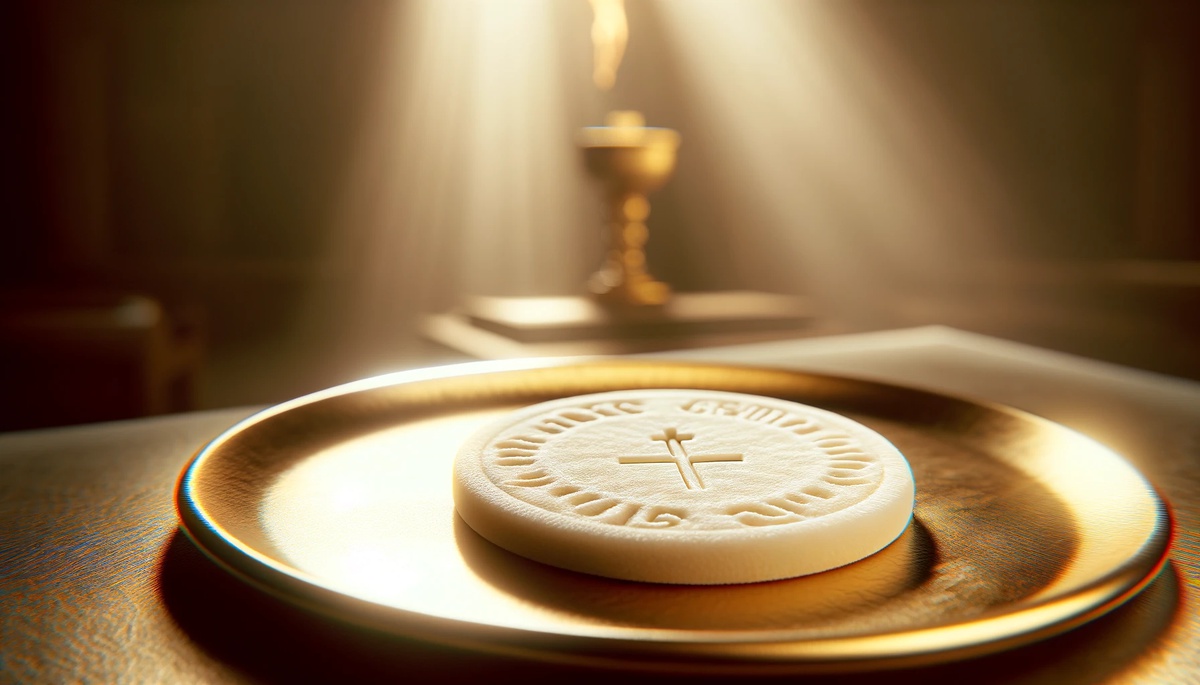Home>Theology and Spirituality>What Is Communion Host


Theology and Spirituality
What Is Communion Host
Published: February 19, 2024
Peter Smith, Editorial Director at Christian.net, combines deep insights into faith, politics, and culture to lead content creation that resonates widely. Awarded for his contributions to religious discourse, he previously headed a major organization for religious communicators, enhancing dialogue on faith's societal impacts.
Discover the significance of the Communion host in theology and spirituality. Learn about its role in the Eucharist and its symbolism. Explore the spiritual and religious aspects of the Communion host.
(Many of the links in this article redirect to a specific reviewed product. Your purchase of these products through affiliate links helps to generate commission for Christian.net, at no extra cost. Learn more)
Table of Contents
Introduction
Communion, also known as the Eucharist or the Lord's Supper, holds profound significance in Christian faith and practice. At the heart of this sacred ritual is the communion host, a central element that symbolizes the body of Christ. The communion host, often a small, unleavened wafer, is a tangible representation of the spiritual nourishment and unity experienced by believers during the Eucharistic celebration.
The communion host serves as a focal point during the Eucharistic liturgy, embodying the presence of Christ and fostering a sense of spiritual communion among the faithful. As the faithful partake of the host, they are reminded of Christ's sacrificial love and invited to partake in the spiritual sustenance offered through this sacred rite.
This article delves into the multifaceted nature of the communion host, exploring its historical roots, theological significance, and diverse forms across Christian traditions. By delving into the essence of the communion host, we gain a deeper understanding of its role in fostering spiritual connection and nourishment within the Christian community.
Read more: What Is A Communion For A Child
Definition of Communion Host
The communion host, also referred to as the sacramental bread or altar bread, holds a central position in the Eucharistic celebration within Christian traditions. It is a sacred element that symbolizes the body of Christ and is integral to the ritual of Holy Communion. Typically, the communion host is a small, unleavened wafer, meticulously prepared to adhere to specific religious guidelines. Its simplicity and purity reflect the unblemished nature of Christ, embodying the essence of spiritual nourishment and unity within the Christian community.
The communion host is consecrated during the Eucharistic liturgy, where it undergoes a profound transformation, believed by adherents to become the actual body of Christ. This process, known as transubstantiation in Catholic theology, signifies the spiritual presence of Christ within the host. As a result, the communion host is not merely a symbol but is regarded as the living reality of Christ's body, inviting believers to partake in a profound communion with the divine.
In its essence, the communion host encapsulates the embodiment of Christ's sacrificial love and serves as a tangible focal point for the faithful during the Eucharistic celebration. As the priest elevates the host and proclaims the words of consecration, the faithful are invited to direct their reverence and devotion towards the transformed host, recognizing it as the embodiment of Christ's presence among them.
The communion host, through its humble form, conveys a profound spiritual reality, inviting believers to partake in the divine life and experience a deep sense of unity with Christ and fellow worshippers. Its significance extends beyond a mere ritualistic element, as it represents the spiritual sustenance and nourishment offered by Christ to his followers.
In summary, the communion host stands as a sacred symbol of Christ's presence and sacrificial love, embodying the spiritual nourishment and unity experienced by believers during the Eucharistic celebration. Its significance is deeply rooted in the theological understanding of Christ's real presence, inviting believers to partake in the divine mystery and experience spiritual communion with the living Christ.
History of Communion Host
The history of the communion host is deeply intertwined with the origins of the Eucharistic tradition within Christianity. Dating back to the Last Supper, a pivotal event in Christian theology, the use of bread as a symbol of Christ's body has ancient roots. During this significant gathering, Jesus shared bread with his disciples, instructing them to partake of it as a representation of his body, given for the forgiveness of sins.
In the early Christian communities, the practice of breaking bread and sharing wine as part of the Eucharistic celebration became a central ritual, reflecting the communal aspect of the faith. The bread used in these early Eucharistic gatherings was often leavened and varied in form, reflecting the diverse cultural contexts in which Christian communities emerged.
As the Christian Church evolved and theological understandings of the Eucharist developed, the form and preparation of the communion host underwent significant changes. By the early Middle Ages, the use of unleavened bread became prevalent, influenced by the theological emphasis on purity and the unleavened bread used during the Passover meal, which Jesus and his disciples shared at the Last Supper.
The Council of Florence in the 15th century further solidified the use of unleavened bread in the Latin Church, establishing specific guidelines for its preparation and form. This standardization aimed to ensure the reverence and solemnity of the Eucharistic celebration, emphasizing the sacred nature of the communion host as the body of Christ.
Throughout history, the communion host has been intricately linked to theological debates and controversies within Christianity. The Protestant Reformation brought about diverse perspectives on the Eucharist, leading to variations in the understanding and use of the communion host among different Christian denominations. While some traditions retained the belief in the real presence of Christ in the host, others interpreted the Eucharist symbolically, influencing their approach to the communion host.
In contemporary times, the history of the communion host continues to evolve within the diverse tapestry of Christian traditions. The preparation and significance of the communion host vary across denominations, reflecting the rich theological diversity and historical legacies that shape the practice of the Eucharist.
The history of the communion host serves as a testament to the enduring significance of the Eucharistic tradition within Christianity, embodying the spiritual nourishment and unity experienced by believers throughout the centuries.
Significance of Communion Host
The communion host holds profound significance within the Christian faith, encapsulating multifaceted layers of theological, spiritual, and communal importance. At the core of its significance lies the belief in the real presence of Christ, making the communion host a tangible embodiment of the divine within the Eucharistic celebration. This belief, rooted in the concept of transubstantiation in Catholic theology and various interpretations in other Christian traditions, elevates the communion host to a sacred symbol of Christ's sacrificial love and redemptive presence among the faithful.
The communion host serves as a focal point for spiritual nourishment, inviting believers to partake in the divine mystery of Christ's body. As the faithful receive the host during the Eucharistic liturgy, they are drawn into a profound communion with Christ, experiencing a tangible connection to his redemptive sacrifice and the promise of eternal life. This act of partaking in the communion host symbolizes the unity of believers in Christ, fostering a sense of communal identity and shared faith within the Christian community.
Furthermore, the communion host embodies the concept of spiritual sustenance, offering nourishment to the soul and strengthening the bond between the individual believer and the divine. Through the act of consuming the host, believers symbolically internalize the spiritual essence of Christ, finding sustenance for their spiritual journey and a source of divine grace and mercy.
The significance of the communion host extends beyond the individual experience, resonating with the broader narrative of salvation and redemption within Christian theology. It serves as a tangible reminder of Christ's enduring presence among his followers, transcending time and space to offer spiritual nourishment and solace to the faithful.
Moreover, the communion host symbolizes the unity of the body of Christ, encompassing the diverse and interconnected nature of the Christian community. As believers partake in the host, they affirm their participation in the larger body of Christ, transcending individual differences and affiliations to embrace a shared identity as members of the universal Church.
In essence, the communion host holds profound significance as a tangible representation of Christ's real presence, spiritual nourishment, communal unity, and the enduring promise of redemption within the Christian faith. Its significance permeates the Eucharistic celebration, inviting believers to partake in the divine mystery and experience the transformative power of Christ's love and grace.
Different Types of Communion Host
The communion host, a central element of the Eucharistic celebration, manifests in diverse forms across Christian traditions, reflecting the rich tapestry of theological and cultural variations within the faith. These variations encompass the preparation, composition, and symbolism of the communion host, offering a nuanced understanding of its significance within different denominations.
-
Unleavened Wafers: In many Christian traditions, particularly within the Catholic Church, unleavened wafers serve as the predominant form of the communion host. These thin, round wafers, devoid of any leavening agents, symbolize the purity and unblemished nature of Christ. The meticulous preparation of unleavened wafers adheres to specific religious guidelines, emphasizing the solemnity and reverence associated with the Eucharistic ritual.
-
Leavened Bread: Some Eastern Orthodox and Eastern Catholic traditions utilize leavened bread as the communion host, diverging from the prevalent use of unleavened wafers in Western Christianity. The inclusion of leaven in the bread symbolizes the risen Christ and accentuates the joyous aspect of the Eucharistic celebration, reflecting the theological nuances and cultural distinctiveness within these traditions.
-
Intinction Bread: In certain Christian denominations, such as the Anglican and Lutheran traditions, the communion host takes the form of small, individual pieces of bread specifically designed for intinction. This practice involves dipping the bread into the consecrated wine before consumption, signifying the unity of Christ's body and blood. Intinction bread offers a tactile and immersive experience of the Eucharistic elements, enriching the sensory dimension of the communion ritual.
-
Gluten-Free Options: With the growing awareness of gluten sensitivities and celiac disease, many churches now offer gluten-free communion hosts to accommodate individuals with dietary restrictions. These specialized hosts, often made from alternative grains or utilizing gluten-free baking techniques, ensure inclusivity and accessibility within the Eucharistic celebration, affirming the diverse needs of the worshiping community.
-
Artisanal and Decorative Hosts: In some instances, particularly within certain Orthodox and Catholic traditions, artisanal and decorative communion hosts are crafted for special liturgical occasions. These intricately designed hosts, adorned with religious symbols and motifs, accentuate the aesthetic dimension of the Eucharistic celebration, underscoring the reverence and beauty associated with the act of communion.
The diverse forms of the communion host reflect the multifaceted nature of the Eucharistic tradition, encompassing theological, cultural, and practical considerations within the rich tapestry of Christian worship. Each type of communion host carries its own symbolic resonance, contributing to the depth and diversity of the Eucharistic experience across Christian denominations.
Read more: What Is A Christian Communion
How Communion Host is Used in the Christian Faith
The communion host, as a central element of the Eucharistic celebration, holds profound significance in the practice of the Christian faith. Its usage transcends mere symbolism, encompassing a deeply transformative and communal role within the spiritual life of believers. The manner in which the communion host is utilized in the Christian faith reflects the rich tapestry of theological, liturgical, and devotional expressions across diverse denominations.
During the Eucharistic liturgy, the communion host is reverently presented and consecrated by ordained clergy, signifying the transformation of the bread into the body of Christ. This sacred moment, often accompanied by prayers and ritual gestures, underscores the real presence of Christ within the communion host, inviting believers to partake in the divine mystery. As the faithful approach the altar to receive the communion host, they do so with profound reverence and devotion, acknowledging the tangible embodiment of Christ's sacrificial love and redemptive presence.
The act of consuming the communion host represents a deeply personal and communal experience for believers. As individuals partake of the consecrated host, they symbolically internalize the spiritual essence of Christ, finding sustenance for their souls and reaffirming their faith in the redemptive power of Christ's sacrifice. This intimate communion with the body of Christ fosters a profound sense of spiritual nourishment and renewal, inviting believers to encounter the living presence of Christ in a tangible and transformative manner.
Moreover, the communal aspect of receiving the communion host underscores the unity of the body of Christ. As believers partake in the Eucharistic feast, they affirm their shared identity as members of the universal Church, transcending individual differences and affiliations to embrace a collective participation in the divine life. The communion host, in this communal context, becomes a unifying force that binds believers together in their shared faith and spiritual journey.
The usage of the communion host in the Christian faith extends beyond the confines of the Eucharistic celebration, permeating the devotional practices of believers. In many traditions, the reserved sacrament, consisting of consecrated communion hosts, is revered and adored in the tabernacle, serving as a focal point for private prayer and contemplation. This ongoing veneration of the communion host outside of the liturgical context reinforces its enduring significance in sustaining the spiritual life of the faithful.
In essence, the communion host is utilized in the Christian faith as a conduit for encountering the real presence of Christ, fostering spiritual nourishment, and affirming the communal unity of believers. Its usage within the Eucharistic celebration and devotional practices reflects the profound depth of the Christian faith, inviting believers to partake in the transformative mystery of Christ's redemptive love and grace.














